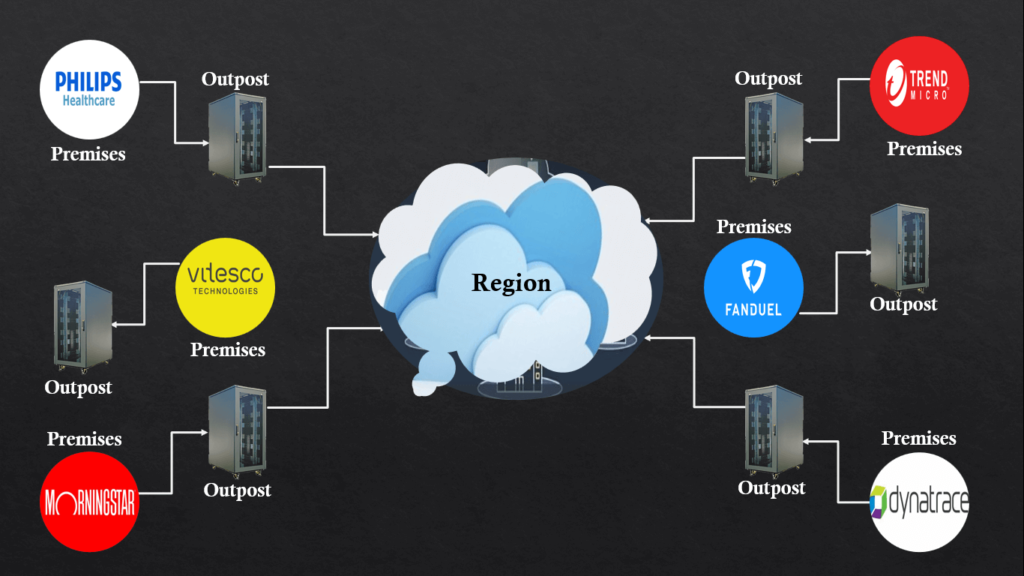Exclusive Benefits of AWS Outposts to Startups and Small Businesses

Cloud computing has come to stay, and it is rapidly changing the terrain of traditional computing. A prominent force in the cloud computing market is AWS.
Amazon Web Services (AWS) unveiled AWS Outposts, another revolutionary cloud computing technology, in December 2019. AWS Outposts is a fully managed hybrid cloud that provides a consistent hybrid experience.
AWS Outposts helps businesses to run AWS services locally in their data centers or using on-premises infrastructure. It is a hybrid cloud that grants businesses the flexibility and scalability of extending AWS infrastructure, services, APIs, and tools on-premises.
Since this service has been running for three years and counting, this article will explore its benefits to businesses. Basically, we’ll look at how it has and can benefit startups and small businesses. Let’s do justice to this.
How AWS Outposts Works:
What is AWS outposts?
AWS Outposts essentially brings native AWS services, infrastructure, and APIs to customers’ physical data centers or colocation facilities. It is an extension of the AWS region and consists of fully managed and configurable racks that are equipped with AWS-designed hardware.
These racks are connected to the AWS cloud via secure and high-speed links, ensuring consistent and low-latency communication.
With AWS Outposts, organizations can seamlessly run a subset of AWS services locally, while still maintaining integration and compatibility with the broader AWS ecosystem.
How outposts work
To use AWS Outposts for your business or startup, do the following:
- Order Outposts configuration based on your business capacity: Your business can acquire customized Outposts configurations with the computation and storage resources they require. Each configuration consists of pre-validated SKUs with integrated networking and a mix of Amazon EC2 and Amazon Elastic Block Store (EBS) volumes.
- Install Outposts on–premises: This is usually done by an AWS representative who delivers your order. He will connect it to power and establish a network connection to the AWS region and local network. Like the equipment in AWS data centers, the equipment used to set up AWS Outposts is entirely managed, monitored, and administered by AWS.
- Launch EC2 instances locally: After installing the Outposts device locally, you can launch EC2 instances using either the AWS Console or common AWS APIs.
- Use Outposts to run apps: Utilizing local resources on the Outpost device or remotely on connected AWS Regions, your development teams can use native AWS services to design and run apps.
As you use AWS Outposts, note the following:
- To support local workloads, AWS Outposts must be able to connect to the neighborhood network.
- It must simultaneously keep a steady connection to an AWS Region.
- The local network must offer WAN access to the Amazon Region and the Internet in order to make this possible.
- Using the same VPC elements, such as Internet Gateways, Amazon VPC Transit Gateways, Virtual Private Gateways, and VPC Endpoints, Amazon may expand Amazon VPCs from AWS Regions to Outposts.
- The resources in the Availability Zone (AZ) that an Outpost is a part of can be used to increase resilience.
The ability to manage resources both on-site and in the public cloud uniformly is one of Outposts’ key advantages.
Benefits of AWS Outposts to Businesses
Seamless hybrid cloud integration:
AWS Outposts provides a unified experience across on-premises and cloud environments. By using the same AWS APIs, control plane, and tools, organizations can develop applications once and consistently deploy them on AWS Outposts and in the cloud. This simplifies the management of hybrid workloads, streamlines development processes, and enables seamless scaling across environments.
Consistent infrastructure and management:
With AWS Outposts, organizations can leverage the same infrastructure, services, and operational models they use in the cloud, thereby ensuring consistency across their hybrid environment. This eliminates the need for separate management systems and allows teams to focus on delivering value rather than managing multiple infrastructures.
Enhanced data security and compliance:
For organizations with strict data residency requirements, AWS Outposts offer enhanced security and compliance. Data remains on-premises, ensuring control over sensitive information, while still benefiting from AWS security services and best practices. This enables organizations to meet industry-specific regulations and compliance standards without sacrificing the agility and scalability of the cloud.
Local data processing and low latency:
Certain applications and workloads require low latency or local data processing. AWS Outposts enables organizations to process data locally, reducing the need for data transfer to the cloud and minimizing latency. This is particularly valuable for use cases such as industrial automation, real-time analytics, and edge computing, where immediate action is crucial.
Benefits to Startups and Small Businesses
AWS Outposts is a powerful tool that can help small businesses and startups to build and run applications on-premises. It gives them the same benefits as those that are running in AWS Regions.
- A startup that is developing a real-time trading application can use AWS Outposts to reduce latency and improve performance for their application. This will allow them to provide a better user experience for their customers.
- A small business that is storing sensitive data can use AWS Outposts to increase security for their data. This will help them to protect their data from unauthorized access.
- AWS Outposts can help a business that is subject to the Health Insurance Portability and Accountability Act (HIPAA) abide by the rules. They can use this to make sure their data is secure and that they are following the law.
Why Should I Use Outpost for My Business
In spite of the benefits of AWS Outposts, it may not be suited for all businesses. Small and medium businesses that require IT infrastructure to function effectively may leverage Outposts for latency and seamless integration.
In this section, I will look at core businesses that can deploy Outpost and why.
Edge computing and IoT:
Instead of sending IoT data back to a data center or cloud, edge computing is a technique for computing on-site where data is received or used. It allows IoT data to be captured and processed at the edge. IoT and edge computing combine well to swiftly analyze data in real time.
Edge computing has therefore become increasingly important as a result of the spread of Internet of Things (IoT) devices and the requirement for real-time decision-making.
AWS Outposts empowers organizations to deploy and manage edge workloads closer to the devices, reducing latency and ensuring reliable connectivity.
This is particularly relevant in industries like manufacturing, energy, and transportation, where efficient operations and quick response times are critical. Thus, if you operate in such industries and has the budget, AWS Outpost can help your business grow.
Manufacturing and industrial automation:
AWS Outposts can transform operations in manufacturing and industrial settings by enabling local data processing, reducing latency, and enhancing security. It enables real-time monitoring and control of production lines, predictive maintenance, and analysis of sensor data for process optimization.
Automating production systems or processes via the use of machinery and equipment is referred to as manufacturing automation.
Equipment like warehouse management systems, sensors, robots, and automated storage and retrieval systems are examples of automated solutions.
Automation in manufacturing ultimately aims to boost output while cutting expenses and it is beneficial for repeated or extremely precise operations.
Due to the advantages it offers, sectors like automotive, food and hygiene, and chemical handling are lured to incorporate automation in their manufacturing processes.
Businesses that use automation can engage Outposts for increased integration with existing systems.
Media and entertainment:
The media and entertainment industry deals with vast amounts of data, including video processing, content delivery, and real-time rendering. AWS Outposts brings the power of the cloud closer to production studios, allowing high-performance workloads to be processed locally.
This reduces the need for data transfer, accelerates content creation workflows, and provides a seamless experience to content creators and consumers alike.
Healthcare and life sciences:
In the healthcare and life sciences domain, data privacy, security, and compliance are paramount.
AWS Outposts allows healthcare providers, research institutions, and pharmaceutical companies to process and store sensitive data locally, ensuring compliance with regulations.
For example, they can utilize Outposts to process patient data locally, enabling faster diagnosis, personalized treatments, and research collaborations. Additionally, it enables collaborative research, speeds up data processing, and promotes the advancement of genomes and personalized treatment.
Healthcare providers may speed up innovation and enhance patient outcomes by combining the cloud’s capability with on-premises data processing.
Retailing and physical stores:
Retailers can leverage AWS Outposts to bring the cloud experience to their physical stores. By running local applications for inventory management, customer analytics, and real-time pricing, retailers can enhance operational efficiency, personalize customer experiences, and optimize their supply chain.
Business finance:
Financial institutions can benefit from AWS Outposts by processing sensitive financial data on-premises. It will also enable them to leverage the cloud for scalability and advanced analytics.
This enables them to meet regulatory requirements, enhance security, and improve decision-making through real-time insights.
For example, they could use AWS Outposts to run a fraud detection application that analyzes financial transactions. This would help them to protect its customers from fraud.
Therefore, choose AWS Outpost if your business belongs to any of the above industries and depends on computing for service delivery. Especially, if your business or startup is looking for a way to build and run applications on-premises. Consider AWS Outposts if you have the budget.
AWS Outposts in Realtime
Different organizations have successfully implemented AWS Outposts to meet their specific requirements.
Dynatrace, FanDuel, Government of Monaco, Morningstar, Philips Healthcare, Trend Micro, and Vitesco Technologies are among the organizations using AWS Outposts.

Dynatrace
Dynatrace provides software intelligence to simplify enterprise cloud complexity and accelerate digital transformation.
As a global software company, Dynatrace needed to process and analyze large volumes of real-time sensor data before deploying them to the cloud. By deploying AWS Outposts in their remote distribution centers, they reduced network latency.
FanDuel
FanDuel Group is an innovative sports-tech entertainment company that is changing the way consumers engage with their favorite sports, teams, and leagues.
With Outposts they meet their customer needs efficiently and everyone is happy.
Morningstar
Morningstar is a leading provider of independent investment research around the globe. With AWS Outposts, it can build once and run application on-premises and easily migrate applications to an AWS Region where possible.
LiveCorp:
LiveCorp works closely with exporters and other stakeholders to continuously improve performance in animal health and welfare, supply chain efficiency, and market access.
As a global logistics company, LiveCorp needed to process and analyze large volumes of real-time sensor data from their shipping containers. By deploying AWS Outposts in their remote distribution centers, they reduced network latency and achieved faster insights for optimizing their supply chain operations.
Philips Healthcare:
Philips Healthcare, a healthcare provider, had stringent data sovereignty requirements that prevented them from utilizing the public cloud for certain patient data.
By adopting AWS Outposts, they maintained control of sensitive healthcare data on-premises while leveraging AWS services for non-sensitive workloads, ensuring compliance and enhancing operational efficiency.
Getting Started with AWS Outposts
Configuring Outposts
Setting up AWS Outposts involves a few simple steps. Organizations can choose the appropriate configuration, including computing, storage, and networking options, based on their specific requirements. Once the hardware is installed, it can be connected to the AWS cloud using dedicated network connections or AWS Direct Connect.
Deploying Applications on Outposts
AWS Outposts supports a wide range of AWS services, including Amazon EC2, Amazon RDS, Amazon EBS, and more.
Organizations can deploy applications on Outposts using familiar AWS APIs, SDKs, and tools. This ensures consistency and compatibility with the broader AWS ecosystem and simplifies the management of hybrid deployments.
Managing and Monitoring Outposts
AWS Outposts can be managed and monitored using the same AWS Management Console, CLI, and SDKs that organizations use for their cloud deployments.
This unified management experience allows teams to easily monitor resource utilization, apply security policies, and automate management tasks.
Conclusion
AWS Outposts is continuously evolving to meet the changing needs of organizations and businesses. As cloud computing and on-premises infrastructure converge further, AWS is likely to introduce new services and capabilities to enhance the Outposts offering.
With its consistent infrastructure, enhanced security, and local data processing capabilities, AWS Outposts opens up new possibilities for hybrid cloud deployments across various industries. Organizations that leverage AWS Outposts can achieve operational efficiency, accelerate innovation, and unlock the full potential of their data.
It is now your turn. What are the challenges you think businesses and organizations will face with AWS Outposts? Use the comment box below.








